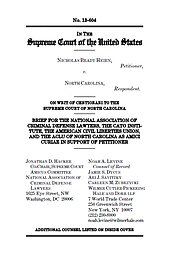Heien v. North Carolina
Learn more about Cato’s Amicus Briefs Program.
To execute any search or seizure, a police officer must reasonably suspect that a crime has been or is being committed based on the facts available to him at the time he executes the search or seizure. Under this standard, searches can be lawful even if the officer is mistaken in his understanding of the facts before him, as long as his understanding led him to reasonably suspect criminal activity. But what if the officer is mistaken about whether a particular activity is actually criminal? Nicholas Heien was driving with a broken taillight in North Carolina when he was pulled over by police who mistakenly believed that state law required two working taillights. Upon receiving consent to search the car—note: you don’t have to agree to such requests!—police found cocaine and charged Heien with drug trafficking. At his trial, Heien sought to suppress the evidence arising out of the search by arguing that the officer never had the reasonable suspicion necessary to pull his vehicle over because having one broken taillight is not illegal. The trial court ruled against him, but the appellate court found a Fourth Amendment violation and reversed. The North Carolina Supreme Court reversed in turn, by a 4–3 vote, holding that an officer’s understanding of the state’s taillight requirements could form the basis for reasonable suspicion because that understanding, while incorrect, was reasonable. There is considerable disagreement among state and federal courts, so the U.S. Supreme Court took the case to resolve the issue. In a brief filed jointly with the National Association of Criminal Defense Lawyers, the ACLU, and the ACLU of North Carolina, Cato argues that the approach taken by the North Carolina Supreme Court is inconsistent with the logic that applies to factual mistakes committed by law enforcement and erodes civil liberties, all while undermining police authority and safety. The allowance for mistakes of fact in police evaluation of suspicious conduct is justified because facts can be ambiguous and unique to each circumstance, and officers must make quick evaluations based on their own observation and expertise. In contrast, the law is the same regardless of the particular circumstance to which it is applied, and can be ascertained long before the officer needs to enforce it. Officers have no specialized expertise in evaluating law, while ambiguities in the criminal code are typically resolved (by courts) in favor of criminal defendants, or struck down for vagueness. The burden placed on citizens by our accommodation of officers’ mistakes of fact is justified as a means of avoiding the social cost of unlawful conduct. Lawful conduct imposes no such cost, however, so excusing mistakes of law serves no social purpose. The North Carolina rule opens citizens up to searches based on all kinds of lawful conduct, as long as law enforcement can have a “reasonable” misapprehension of the law in a given area. To avoid the intrusion of police searches, people will need not only to avoid appearing to participate in criminal activity, but also to avoid appearing to participate in innocent activity which police could construe as criminal. The result is a system in which “ignorance of the law is no excuse” for citizens facing conviction, but police can use their own ignorance about the law to their advantage. Officers are therefore disincentivized from knowing the law, which undermines public confidence in their authority and encourages citizens to dispute it during police encounters—putting both parties in greater danger. The U.S. Supreme Court should make clear that law enforcement mistakes of law preclude lawful searches and seizures under the Fourth Amendment.

This work is licensed under a Creative Commons Attribution-NonCommercial-ShareAlike 4.0 International License.
